- Home
- Charles L. Grant
Riders in the Sky - [Millennium Quartet 04] Page 9
Riders in the Sky - [Millennium Quartet 04] Read online
Page 9
None of your business, he’d told his shadow as he raced back for home; none of your business, and you’re probably wrong anyway, so let it go, keep on keeping on with what you’re already doing.
Hiding.
This morning he had stood at the sink in the tiny kitchen and said, “From what?”
During each monthly grocery run, he usually treated himself to lunch at either Betsy’s or the Tide, where he eavesdropped unashamedly and, if he was lucky, grabbed an old copy of the Camoret Weekly. This way he was able to pick up some of what was going on around the island. So, as far as he could tell, there had been no unusual spike in the death rate, violent or otherwise, the famine had evidently had little effect here, the plague had mercifully left them untouched, and thus far they had escaped the current turmoil that swept across the mainland.
From what? he asked the reflection, and it gave him a disgusted look that told him not to be so stupid, he knew damn well from what.
ghost-white
Nevertheless, it was time.
Well past time.
He put the brush down, ran a hand across his chest, and reminded himself this was only an experiment, not a complete change in habit. The recluse was only checking the landscape, not surrendering the safety of his cave.
He hurried out of the room to the landing, and paused at the top of the narrow staircase. His bedroom was on the right, in front, a second bedroom on his left. Behind him, on the right, was the bathroom, and on his left, another room he used for storage.
The door was ajar.
“Damnit,” he muttered harshly, and took a step down, trying to ignore it.
He couldn’t.
He returned to the landing and pushed the door open, stepped over the threshold and looked to the right, where another door, a closet, was open as well.
His eyes closed briefly and he took a deep breath. The house was poorly constructed, he knew this. Doors sometimes opened on their own, the frames weren’t always true. Once he’d understood this, he was determined not to read anything into it. Yet, as he kicked the closet door shut and for good measure whacked it with the heel of his hand, he decided it was past time to nail the damn thing shut.
He didn’t need this.
He didn’t need this at all. Especially not today.
The first thing he had done after Cutler had shown him around and left, was drag his rope-bound suitcase into the storeroom. There he had emptied most of it into the closet, and hadn’t been back since.
Except to close the goddamn door.
He glared at it now, daring it to defy him, then left the room, slammed the outer door behind him, and took the stairs down one at a time. Five minutes later he was on the bike and on his way. He grinned into the faint wind of his own making; he laughed at a blackbird that tried to hop beside him, gave up, and soared away; he coasted and laughed again and wished he had done this a long time ago.
It was an odd feeling, this good feeling; not until now did he understand how much he had missed it.
How much had been lost by being so alone.
* * * *
3
Between the sheriff’s department and a redbrick building that served as town hall and courthouse was a large pocket park, grass and high trees and a public bicycle stand where Casey locked up his bike. Wiped nervous hands on his jeans, scolded himself for acting like a kid on his first date, and headed south.
Three blocks later he stopped.
Unlike a number of other eateries on the island, Betsy’s didn’t pretend to be anything other than what it was—a simple sandwich shop, no frills, no fancy summer prices. A few tables, a few booths, a short counter along the left-hand wall for those who wanted nothing more than a slice of pie and a cup of coffee. A pine forest mural along the back wall that had always amused Casey because whenever someone popped out of the kitchen, it seemed as if they were walking out of a tree. Open at six for breakfast, closed at seven. Having established it just before the turn of the century, the original Betsy and her family were long gone, her several successors not bothering to change the name.
Gloria Nazario was the current owner, a pleasantly rotund Cuban refugee whose brother, Hector, did most of the cooking while she did most of the serving and a black man named Junior Raybourn did most of the sweeping up.
Casey sat on the first stool nearest the door. Although the room was nearly full, no one had done more than glance up when he’d entered, which was fine by him. Today he wanted to listen as much as eat; with his back to the room, he was, he figured, about as invisible as someone his size could get. And with the long mirror on the wall behind the coffee urns and other counter paraphernalia, he was able to watch most of the room without having to stare.
The waitress, a too-thin young woman with too much makeup and bottle-blond hair that needed touching up at the roots, took his order without speaking, despite his awkward attempts at conversation. She wrote, she checked a price on the menu, and walked into the kitchen.
Not a word.
Not a look.
All right, he thought; so I’m a little out of practice.
Yet he couldn’t help a check in the mirror, just to be sure he still looked presentable. There had been a few times, after pedaling home, when he’d noticed things sticking in his hair—bits of leaves, once a spider, once a feather that the wind had tucked behind his ear. The image of what people must have thought had made him laugh then; he didn’t laugh now.
There was nothing wrong that he could see.
All right, no problem, she’s having a bad day.
Nevertheless, as he waited for his lunch, he was puzzled by the glances people gave him when they thought he couldn’t see them—not really unfriendly, just... wary. Suspicious. Not that the reactions surprised him very much—he was, after all, the stranger who lived among them. Curiosity was to be expected when he sidestepped his routine.
Still, he was more than relieved when the meal finally came and he was able to concentrate on fueling his body, not his imagination.
Not to mention, he reminded himself, a little judicious eavesdropping if he could, picking sentences and fragments out of the conversations that filled the shop.
It wasn’t that difficult; it was as if he weren’t there.
In the booth by the entrance three men, suits and ties and briefcases, argued about the Ausso-Indonesian War, debating the moral ambiguities of New Zealand desperately trying to keep herself neutral despite the deaths of her citizens in the initial incident. Other island-cluster nations had begun to declare for Indonesia. China was concerned. Australia was puzzled that no one, yet, had officially declared for her. Race rather than right had entered the propaganda, and the continent nation couldn’t understand why she had been left to stand on her own.
A friend passing the booth suggested the three ought to concern themselves more with North Korea’s massing troops a few miles north of the Demilitarized Zone. “We’re gonna get sucked in,” he said bitterly. “Just like the first time. You watch, we’re gonna get sucked in.”
* * * *
From somewhere else:
“You really going to sell?”
“Hell, I’m tired of having to do the causeway route every time I want to see a damn movie.”
“You get an offer?”
“Sort of, yeah.”
“Don’t tell me...Cutler.”
“Eat your dessert, we’re late the judge’ll kill us.”
* * * *
“Goddamn Freck says I shouldn’t have been out so late. Jesus, it was only nine o’ goddamn clock. Who thinks they’re gonna get mugged at nine o’clock, for God’s sake? Here, for God’s sake.”
“Dumbass deputy couldn’t arrest a jaywalker, the stupid son of a bitch. So ... what, he say you were asking for it?” “As much as.”
“Stupid son of a bitch.”
“Tell me about it. I swear to God, I can’t wait to get out of here.”
* * * *
“... have to pry that boat o
ut of my cold dead hands.”
“So you’re not selling?”
“You deaf, boy? I’d rather sell my wife.”
* * * *
Casey slid a month-old copy of the Weekly toward him, scanning the headlines and sighing without a sound. A fragmented Yugoslavia continued to tear itself apart; revolutions in Brazil, Chile, plus a half dozen more across Central and Southern Africa; India and Pakistan glared at each other across mountain passes, exchanging random artillery fire, raising banners; Japan altering its constitution to allow for a full-blown, full-time army and navy.
All of this he had already seen on television, but seeing it in print, no matter how briefly covered, somehow made it worse.
He picked at his french fries, flipped over a page, and glanced through several articles that were, in essence, ill-disguised editorials, righteous rants against the growing number of households leaving the island because of “hooligan activity” and “bald political pressure,” all not so vaguely attributed to an “unholy alliance” between Norville Cutler’s various businesses and Mayor Cribbs’s alleged greed, the purpose of which was neither hinted at nor explained. Casey had the feeling that were he a regular reader he’d already know. He also sensed an angry desperation here, a warning of some kind that time was running out for whatever the editor felt was on the way; and it didn’t, he figured, have anything to do with the problems on the mainland.
I really ought to get out more, he thought, and ate, read, after a while frowned because there was something about the tabloid-size newspaper that didn’t seem quite as it should be. Blatant editorializing in what were supposed to be ordinary news reports was one thing, the weekly newsmagazines did it all the time, but as he flipped the pages back and forth randomly, he suspected the answer was right there in front of him. Something to do with ... frowning deeper, he turned to the back page, then to the classified section, the want ads, the garage sales. Another page or two at random, and he finally realized what it was—advertising. There were hardly any ads, display or otherwise, and while he was no expert, he was fairly certain that ad revenue was what kept a newspaper in business.
Especially this time of year. The Monday before Thanksgiving, a few weeks before Christmas, the paper should be bulging with holiday sale announcements, even if many of the seasonal shops had already shut down.
“You have to go to the office for a new one,” Gloria said as she slid his bill toward him. Her hair, long and black, was caught in a hairnet, her face touched with lines drawn by the work she did. Large black eyes, watching him, not smiling.
“You don’t sell it anymore?”
She shook her head. “Not worth it.” A glance toward the door. “Not to no one hardly anymore.”
He laid his money next to his plate, a gesture to indicate he didn’t want the change.
“You work for him, don’t you?” she asked as he pushed off the stool.
“Who?”
“Mr. Cutler.”
He shrugged. “I guess so. Yes.”
She nodded once. “Okay. So don’t come back no more, okay? Go somewhere else.”
He stared in disbelief, but she had already turned her back, fussing with coffee cups, fiddling with one of the urns. A deliberate, and fearful, dismissal that made him want to at least ask for an explanation. But the set of her back, the way her hands darted at doing nothing changed his mind.
Avoiding the gazes of the other customers, he left, stood on the sidewalk, squinting until he grew accustomed to the bright afternoon sun. Until the surge of anger that followed him outside subsided. Not enough, however, to completely quash the temptation to walk into another shop to check the owner’s or clerk’s reaction. He almost did it. He almost turned into the gift shop next to Betsy’s on the right, or the photo shop on the left. Just to see. The problem was, even if he was asked to leave, or treated coldly, he still wouldn’t know why. He was only a handyman, for crying out loud, and hadn’t seen Cutler more than a handful of times since he’d taken the job. His pay was usually picked up at Cutler’s downtown office—only twice had Cutler brought it out himself, and that was because the man wanted to check on his properties, not because he was the kindly employer who cared about his people.
What the hell was the guy doing that for God’s sake hired help should be tarred with the same brush?
It was, if he thought about it long enough, almost amusing. He had heard of people being barred from bars before, but never from a sandwich shop. Begone, you weirdo, and never darken my mayonnaise again.
With an imperceptible shake of his head, and a fleeting one-sided grin, he started up the street, hands in his pockets, telling himself that he was undoubtedly overreacting. Gloria had problems with Cutler, that much was obvious; no reason to believe that anyone else would treat him the same. Hell, most of Camoret didn’t even know who he was, much less who he worked for. But each time he paused to enter another store, another shop, he changed his mind and moved on.
Halfway up the next block he reached a cedar-shake building no larger than a small bungalow set well back from the sidewalk, as if distancing itself from the businesses on either side. A white picket fence divided concrete from grass and two large cherry trees slowly and at last dropping their leaves. He knew there were only two rooms inside—a small waiting room, and a large office behind it. Norville Cutler Enterprises, and the only person he’d ever seen there was Mandy Poplin, the receptionist he assumed doubled as a secretary. He supposed he could always ask her what was going on; not that she would tell him. Each time he picked up his pay, an envelope filled with cash and a receipt, their conversation was little more than formally polite.
Here’s your pay, Mr. Chisholm.
Thanks, Mandy. Nice weather we’re having.
Yes, it is. We’ll see you next month.
He walked on, annoyed less at his treatment now than at the deflation of his adventure. All that buildup, all the anxiety, all the reasons why he shouldn’t get involved in town life again, all for nothing.
Abruptly he stopped and looked over his shoulder.
Gloria Nazario had already known he worked for Cutler. She had asked him several months ago, and it hadn’t seemed to bother her then. So what had changed?
Go back, be polite, be deferential, ask.
He couldn’t do it.
Instead, he crossed the street and walked another block, absently checking the Christmas decorations in some of the windows, Thanksgiving displays in others. What he would do, he decided, is pick up the latest Weekly edition, see if there was something in there, something new, that would give him more information. Maybe even ask the editor himself. Assuming, he thought with a quick sour grin, that the man didn’t toss him out on his ear.
A quicker step, another block, and he hesitated only a second before entering the Camoret Weekly’s office. The door had barely closed behind him before he wondered if he hadn’t made a mistake.
* * * *
4
The outer room was empty, a stack of new papers on the counter, still bundled. A wall clock ticked loudly. A man’s voice in back, raised in anger.
None of your business, Casey cautioned. He grabbed a paper, fumbled in his pocket to produce a dollar bill he dropped on the counter, and turned to leave.
None of your business; until he heard another man cry out and the sound of something large crashing onto the floor, followed by the distinct sound of breaking glass.
Don’t, he ordered as he lifted the flap; asking for trouble, he warned as he dropped the paper where he’d found it, crossed the room hurriedly and opened the door just enough to stick his head through.
An old man leaned heavily against the left-hand wall, panting, one hand over his heart. On the floor at his feet a scattering of folders and papers, and a computer monitor, its face shattered. A short man in jeans and brown leather jacket, heavy beard and tight curly hair, stood in the middle of the room, arms folded across a chest so large it made him seem deformed. A much taller man in denim
coveralls, whip-lean and stringy dark hair, sideburns down to his jaw, had his hand on a printer as if ready to sweep it off its stand.
For an instant the three stared at Casey as if he’d dropped in through the ceiling.
Casey looked at the old man and said, “Trouble, Mr. Hull?”
“Who the hell are you?” the short one demanded. “Get lost.”
Casey ignored him. “Mr. Hull?”
The editor blinked rapidly, head trembling. Although his hair was mussed, his bow tie askew, he didn’t look as if he’d been hurt, just scared half to death. His lips worked, but made no sound.
“Damnit, Cord, stuff this jerk somewhere, I ain’t got time for this shit.”

![[Oxrun Station] The Orchard Read online](http://i1.bookreadfree.com/i/03/17/oxrun_station_the_orchard_preview.jpg) [Oxrun Station] The Orchard
[Oxrun Station] The Orchard![Riders in the Sky - [Millennium Quartet 04] Read online](http://i1.bookreadfree.com/i/03/20/riders_in_the_sky_-_millennium_quartet_04_preview.jpg) Riders in the Sky - [Millennium Quartet 04]
Riders in the Sky - [Millennium Quartet 04]![Chariot - [Millennium Quartet 03] Read online](http://i1.bookreadfree.com/i/03/19/chariot_-_millennium_quartet_03_preview.jpg) Chariot - [Millennium Quartet 03]
Chariot - [Millennium Quartet 03]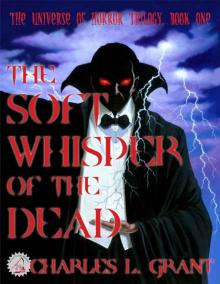 The Universe of Horror Volume 1: The Soft Whisper of the Dead (Neccon Classic Horror)
The Universe of Horror Volume 1: The Soft Whisper of the Dead (Neccon Classic Horror)![[Oxrun Station] Dialing The Wind Read online](http://i1.bookreadfree.com/i/03/19/oxrun_station_dialing_the_wind_preview.jpg) [Oxrun Station] Dialing The Wind
[Oxrun Station] Dialing The Wind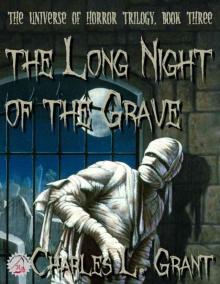 The Universe of Horror Volume 3: The Long Night of the Grave (Neccon Classic Horror)
The Universe of Horror Volume 3: The Long Night of the Grave (Neccon Classic Horror) The Grave - An Oxrun Station Novel (Oxrun Station Novels)
The Grave - An Oxrun Station Novel (Oxrun Station Novels)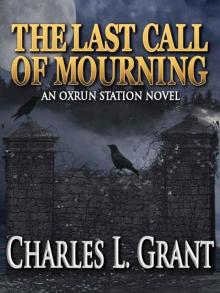 The Last Call of Mourning - An Oxrun Station Novel (Oxrun Station Novels)
The Last Call of Mourning - An Oxrun Station Novel (Oxrun Station Novels) The Complete Short Fiction of Charles L. Grant, Volume IV: The Black Carousel
The Complete Short Fiction of Charles L. Grant, Volume IV: The Black Carousel The Bloodwind - An Oxrun Station Novel (Oxrun Station Novels)
The Bloodwind - An Oxrun Station Novel (Oxrun Station Novels) The Curse
The Curse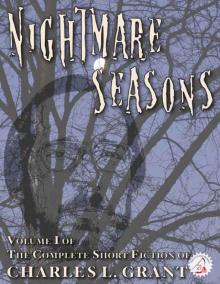 The Complete Short Fiction of Charles L. Grant Volume 1: Nightmare Seasons (Necon Classic Horror)
The Complete Short Fiction of Charles L. Grant Volume 1: Nightmare Seasons (Necon Classic Horror)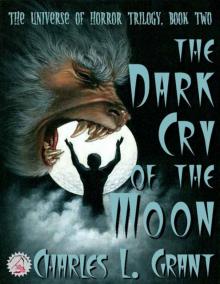 The Universe of Horror Volume 2: The Dark Cry of the Moon (Neccon Classic Horror)
The Universe of Horror Volume 2: The Dark Cry of the Moon (Neccon Classic Horror) Watcher: Based on the Apocalypse (World of Darkness : Werewolf)
Watcher: Based on the Apocalypse (World of Darkness : Werewolf)![[Oxrun Station] The Bloodwind Read online](http://i1.bookreadfree.com/i/03/25/oxrun_station_the_bloodwind_preview.jpg) [Oxrun Station] The Bloodwind
[Oxrun Station] The Bloodwind The Orchard
The Orchard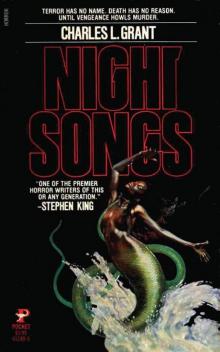 Night Songs
Night Songs Shadows 3
Shadows 3![Symphony - [Millennium Quartet 01] Read online](http://i1.bookreadfree.com/i1/04/02/symphony_-_millennium_quartet_01_preview.jpg) Symphony - [Millennium Quartet 01]
Symphony - [Millennium Quartet 01] The Hour of the Oxrun Dead (Necon Classic Horror)
The Hour of the Oxrun Dead (Necon Classic Horror)![In the Mood - [Millennium Quartet 02] Read online](http://i1.bookreadfree.com/i1/03/31/in_the_mood_-_millennium_quartet_02_preview.jpg) In the Mood - [Millennium Quartet 02]
In the Mood - [Millennium Quartet 02]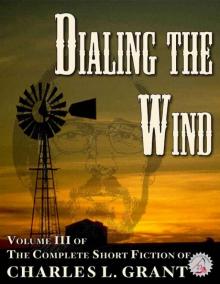 The Complete Short Fiction of Charles L. Grant Volume 3: Dialing the Wind (Neccon Classic Horror)
The Complete Short Fiction of Charles L. Grant Volume 3: Dialing the Wind (Neccon Classic Horror)![[Oxrun Station] The Last Call of Mourning Read online](http://i1.bookreadfree.com/i2/04/05/oxrun_station_the_last_call_of_mourning_preview.jpg) [Oxrun Station] The Last Call of Mourning
[Oxrun Station] The Last Call of Mourning The Pet
The Pet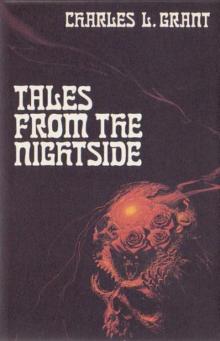 Tales from the Nightside
Tales from the Nightside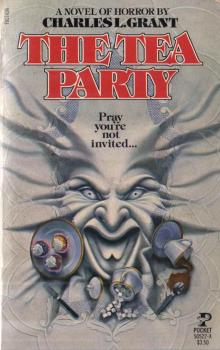 The Tea Party - A Novel of Horror
The Tea Party - A Novel of Horror The Complete Short Fiction of Charles L. Grant Volume 2: The Orchard (Necon Classic Horror)
The Complete Short Fiction of Charles L. Grant Volume 2: The Orchard (Necon Classic Horror) Whirlwind
Whirlwind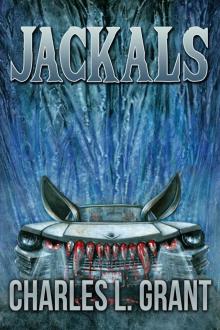 Jackals
Jackals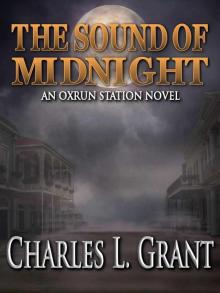 The Sound of Midnight - An Oxrun Station Novel
The Sound of Midnight - An Oxrun Station Novel